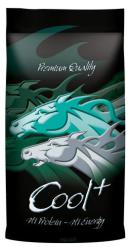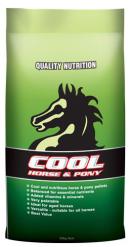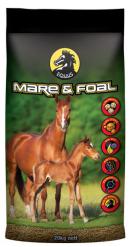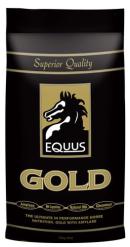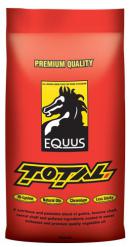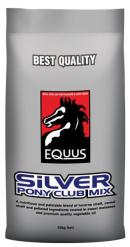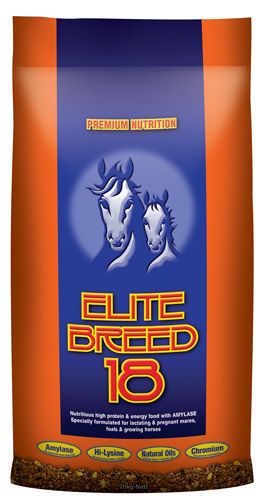
| Product No. | 4448520 |
|---|---|
| Description | ELITE BREED 18 20kg |
| Unit | 20 KG |
| Weight | 20 |
Nutritious Breeding Formula
ELITE BREED 18 WITH AMYLASE - Natures Power!
Elite Breed 18 is a highly nutritious and palatable breeder and grower diet. Feed where nutritional demands are very high such as during lactation and to young growing horses. Also ideal for long yearlings and two year olds in training.
New Formula Elite Breed 18 leads the way in breeder nutrition with the inclusion of Amylase and Organic Chromium to further enhance digestion and energy utilisation.

Analysis (as fed)
| Protein (min) | 18% |
| Fat (min) | 9% |
| Fibre (max) | 13% |
Energy & Coolness Rating System
The innovative "ENERGY & COOLNESS" rating system is designed to make it easier to understand the differences in the energy and coolness of the various foods in the Equus Range. Energy and coolness are both rated on a scale of one to six. A rating of six for energy indicates the energy level of that food is very high and a rating of six for coolness indicates that particular food is very cool.

Amylase Leading the Way – Naturally, Effectively & Safely!
Elite Breed 18 contains added Amylase to aid starch digestion in the small intestine naturally, effectively and safely without the need for expensive over processing.
The addition of Amylase to Elite Breed 18 is one of the most advanced improvements in performance horse nutrition to occur in many years.
Amylase is a natural protein enzyme that is responsible for efficient starch digestion in the small intestine.
Horses do not produce adequate Amylase necessary for the digestion of large amounts of starch, this is why they have more problems digesting starch compared to other grain eating animals.
Lack of Amylase can result in incomplete starch digestion in the small intestine resulting in excessive undigested starch reaching the large intestine where it is fermented producing lactic acid. Excessive lactic acid can cause serious problems such as caecal acidosis which can lead to colic, laminitis, diarrhoea and poor fibre digestion.
Improve Your Own Grain
If Elite Breed 18 is fed at a rate of 3kg per day along with your own grain, enough Amylase will be consumed to have a beneficial effect on the digestion of starch in the extra grain.
Hi-Lysine – For strong muscle growth and recovery!
Protein is made up of components called amino acids, of which some must be provided via the diet and others synthesised by the animal. Amino acids needed to be supplied via the diet are called essential amino acids, of these lysine is normally the one most likely to be in short supply.
Elite Breed 18 is balanced for essential amino acids, particularly Lysine, and as can be seen in the "Lysine" chart (below) contains a substantially higher level of lysine than typical horse feeds. The high lysine and balanced protein of Elite Breed 18 ensures efficient protein utilisation, improved lactation in mares, strong growth in young horses, enhanced muscle tone and aids in muscle recovery after strenuous exercise.
Organic Chromium – Enhanced performance!
Research has shown beneficial responses to supplementing diets with organic chromium where high stress, strenuous activity is performed.
Organic chromium has been added to Elite Breed 18 to help maintain chromium levels during strenuous activity, this improves the bodies sensitivity to insulin, which in turn improves glucose utilisation and therefore the horses performance.
Natural Oils – Highly digestible!
Elite Breed 18 contains premium quality vegetable oils which are an excellent source of readily available energy. Vegetable Oils provide cool, safe and manageable energy and is a more efficient source of energy than carbohydrates. Oil has the advantage of sparing glycogen in the muscle and liver of horses thus increasing the time taken for the muscle to become fatigued.
Oil contains approximately two and a quarter times more energy than carbohydrates and has an excellent balance of essential omega fatty acids. Omega fatty acids impart an attractive sheen to a horses coat, are important for maintaining healthy skin and are necessary for many biological functions.They also aid in the absorption and storage of the fat soluble vitamins A, D, E & K.
Extrusion – The facts!
Extrusion and micronising are expensive and unnecessary processes that are generally not required where diets are well balanced and specifically formulated for high starch digestibility in the small intestine. Excessive heat processing of horse foods is only necessary to cover inadequacies in diets not safe in their natural state.
Contrary to claims made by some horse food manufacturers extrusion is not new age technology. Extrusion has been used to process animal feeds in Australia for over 40 years.
Feed Information
Daily Feeding Chart
| Horse Weight | Elite Breed | Hay# | |
|---|---|---|---|
| Weaner (4 months) |
160kg
|
3.5kg
|
1.5kg
|
| Weanling, moderate growth (6 months) |
200
|
3.5
|
2.0
|
| Weanling, rapid growth (6 months) |
200
|
4.0
|
2.0
|
| Yearlings, moderate growth (12 months) |
300
|
3.5
|
3.0
|
| Yearlings, rapid growth (12 months) |
300
|
4.0
|
3.0
|
| Long yearlings at rest (18 months) |
365
|
3.0
|
4.0
|
| Long yearlings in training (18 months) | 365 | 4.5 | 4.5 |
| Two year olds at rest |
410
|
2.0
|
5.0
|
| Two year olds in training |
410
|
4.5
|
5.0
|
| Early Lactation |
450
|
5.0
|
5.0
|
| Late Lactation |
450
|
3.0
|
6.0
|
| Pregnant Mares (9 to 10 months) |
450
|
1.5
|
7.0
|
| Pregnant Mares (11 months) |
450
|
2.5
|
5.0
|
| Breeding stallions |
450
|
2.5
|
5.5
|
| Intense Work | 450 | 6.5 | 4.5 |
| Moderate Work | 450 | 4.0 | 4.5 |
| Light Work | 450 | 2.5 | 5.5 |
|
Do not feed more than approximately 0.80% of body weight (3.6kg for a 450kg horse) of Elite Breed 18 in a single meal. |
|||
Comparitive Nutrient Graphs



Ingredients
Elite Breed 18 is formulated from a selection of the following ingredients and/or their by-products: Lupins, sunflower, corn, rice, barley, peas, beans, canola, bran, pollard, vegetable oil, molasses, limestone, di-calcium phosphate, amylase, organic chromium, electrolytes, vitamins and minerals.
Warnings
This feed has been manufactured specifically for animals as described, do not feed to any other species of animal.
This product does not contain restricted animal material.
Vitamins, Minerals & Electrolytes
Elite Breed 18 fed at the rate of 5.0kg per day along with 5.0kg of roughage will approx. provide the following levels of vitamins and minerals:
| TRACE MINERALS & ELECTROLYTES | |
| Iron (Fe) |
2,045 mg
|
| Copper (Cu) |
190 mg
|
| Manganese (Mn) |
920 mg
|
| Zinc (Zn) |
770 mg
|
| Chromium (Cr) |
1,000 mcg
|
| Cobalt (Co) |
3,100 mcg
|
| Iodine (I) |
1,900 mcg
|
| Selenium (Se) |
2,800 mcg
|
| Calcium (Ca) |
75 gm
|
| Phosphorus (P) |
43 gm
|
| Magnesium (Mg) |
28 gm
|
| Sodium (Na) |
35 gm
|
| Chloride (CI) |
64 gm
|
| Potassium (K) |
115 gm
|
| VITAMINS | |
| Vitamin A |
182,790 iu
|
| Vitamin D3 |
9,600 iu
|
| Vitamin E |
1,300 mg
|
| Thiamine (B1) |
87 mg
|
| Riboflavin (B2) |
95 mg
|
| Pyridoxine (B6) |
60 mg
|
| Folic Acid |
30 mg
|
| Pantothenic acid |
125 mg
|
| Niacin |
395 mg
|
| Choline |
11,510 mg
|
| Biotin |
4,050 mcg
|
| Vitamin B12 |
200 mcg
|
Electrolyte Chart
| SODIUM CHLORIDE (SALT) REPLACEMENT | |
| Mild Sweating | Nil |
| Moderate Sweating | 25 to 75gms of salt per day |
| Heavy Sweating | 75 to 125gms of salt per day |
| Excessive & prolonged sweating | 125 to 225gms of salt per day |
| SODIUM, CHLORIDE (SALT) & POTASSIUM REPLACEMENT | |
| Mild Sweating | Nil |
| Moderate Sweating | 30 to 100gms of salt per day |
| Heavy Sweating | 100 to 175gms of salt per day |
| Excessive & prolonged sweating | 175 to 300gms of salt per day |
| SALT & POTASSIUM MIX | |
| There are two options that can be used to make this mixture: Mixture 1. Mix equal parts of "Lite Salt"* and salt. Mixture 2. Mix 75% salt with 25% potassium chloride. Both mixtures are similar and will provide the main electrolytes sodium, chloride and potassium in a balanced ratio to each other |
|
| * "Lite Salt" (or similar products that contain approximately half salt and half potassium chloride) is a mixture of salt and potassium chloride and can be purchased at most supermarkets or grocery stores. | |
Electrolytes – The Right Balance!
Elite Breed 18 contains essential electrolytes to aid in the prevention of deficiencies, particularly potassium, sodium and chloride. Under normal conditions no extra electrolyte supplementation will be necessary. Where moderate to heavy sweating occurs it may be necessary to supplement extra sodium chloride (salt) and to a lesser extent potassium. This can be done cheaply and effectively without the need to buy expensive electrolyte mixes.
The ELECTROLYTE CHART (above) following chart indicates the approximate amount of electrolytes that a 450 kg horse is likely to require in addition to that supplied by Elite Breed 18.
Points to note when feeding electrolytes
- When dosing high levels of electrolytes it is important to ensure that fresh drinking water is available at all times. This will allow the horse to regulate its fluid intake and ensure that dehydration does not occur.
- Only administer high levels of electrolytes when heavy sweating has occurred.
- It is recommended that electrolytes be added to the food or administered as a drench.
- Do not add electrolytes to the drinking water as the horse will not be able to regulate its water / electrolyte balance and problems may occur.
- If the drinking water has a high mineral content, such as bore water, it is recommended that you discuss the feeding of extra electrolytes with your veterinarian before proceeding.

